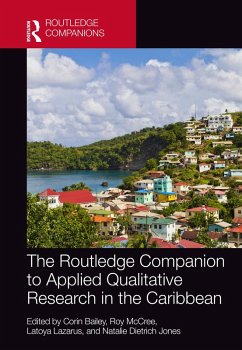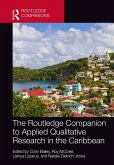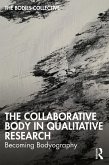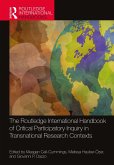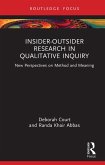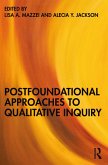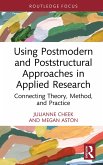The Routledge Companion to Applied Qualitative Research in the Caribbean (eBook, ePUB)
Redaktion: Bailey, Corin; Dietrich Jones, Natalie; Lazarus, Latoya; McCree, Roy
45,95 €
45,95 €
inkl. MwSt.
Sofort per Download lieferbar

23 °P sammeln
45,95 €
Als Download kaufen

45,95 €
inkl. MwSt.
Sofort per Download lieferbar

23 °P sammeln
Jetzt verschenken
Alle Infos zum eBook verschenken
45,95 €
inkl. MwSt.
Sofort per Download lieferbar
Alle Infos zum eBook verschenken

23 °P sammeln
The Routledge Companion to Applied Qualitative Research in the Caribbean (eBook, ePUB)
Redaktion: Bailey, Corin; Dietrich Jones, Natalie; Lazarus, Latoya; McCree, Roy
- Format: ePub
- Merkliste
- Auf die Merkliste
- Bewerten Bewerten
- Teilen
- Produkt teilen
- Produkterinnerung
- Produkterinnerung

Bitte loggen Sie sich zunächst in Ihr Kundenkonto ein oder registrieren Sie sich bei
bücher.de, um das eBook-Abo tolino select nutzen zu können.
Hier können Sie sich einloggen
Hier können Sie sich einloggen
Sie sind bereits eingeloggt. Klicken Sie auf 2. tolino select Abo, um fortzufahren.

Bitte loggen Sie sich zunächst in Ihr Kundenkonto ein oder registrieren Sie sich bei bücher.de, um das eBook-Abo tolino select nutzen zu können.
This cutting-edge book provides a comprehensive examination of applied qualitative research in the Caribbean. It highlights the methodological diversity of qualitative research by drawing on its various approaches to the study of Caribbean society, addressing the lack of published qualitative research on the region.
- Geräte: eReader
- mit Kopierschutz
- eBook Hilfe
Andere Kunden interessierten sich auch für
![The Routledge Companion to Applied Qualitative Research in the Caribbean (eBook, PDF) The Routledge Companion to Applied Qualitative Research in the Caribbean (eBook, PDF)]() The Routledge Companion to Applied Qualitative Research in the Caribbean (eBook, PDF)45,95 €
The Routledge Companion to Applied Qualitative Research in the Caribbean (eBook, PDF)45,95 €![The Routledge International Handbook of Transdisciplinary Feminist Research and Methodological Praxis (eBook, ePUB) The Routledge International Handbook of Transdisciplinary Feminist Research and Methodological Praxis (eBook, ePUB)]() The Routledge International Handbook of Transdisciplinary Feminist Research and Methodological Praxis (eBook, ePUB)45,95 €
The Routledge International Handbook of Transdisciplinary Feminist Research and Methodological Praxis (eBook, ePUB)45,95 €![The Collaborative Body in Qualitative Research (eBook, ePUB) The Collaborative Body in Qualitative Research (eBook, ePUB)]() Bodies CollectiveThe Collaborative Body in Qualitative Research (eBook, ePUB)41,95 €
Bodies CollectiveThe Collaborative Body in Qualitative Research (eBook, ePUB)41,95 €![The Routledge International Handbook of Critical Participatory Inquiry in Transnational Research Contexts (eBook, ePUB) The Routledge International Handbook of Critical Participatory Inquiry in Transnational Research Contexts (eBook, ePUB)]() The Routledge International Handbook of Critical Participatory Inquiry in Transnational Research Contexts (eBook, ePUB)45,95 €
The Routledge International Handbook of Critical Participatory Inquiry in Transnational Research Contexts (eBook, ePUB)45,95 €![Insider-Outsider Research in Qualitative Inquiry (eBook, ePUB) Insider-Outsider Research in Qualitative Inquiry (eBook, ePUB)]() Deborah CourtInsider-Outsider Research in Qualitative Inquiry (eBook, ePUB)20,95 €
Deborah CourtInsider-Outsider Research in Qualitative Inquiry (eBook, ePUB)20,95 €![Postfoundational Approaches to Qualitative Inquiry (eBook, ePUB) Postfoundational Approaches to Qualitative Inquiry (eBook, ePUB)]() Postfoundational Approaches to Qualitative Inquiry (eBook, ePUB)41,95 €
Postfoundational Approaches to Qualitative Inquiry (eBook, ePUB)41,95 €![Using Postmodern and Poststructural Approaches in Applied Research (eBook, ePUB) Using Postmodern and Poststructural Approaches in Applied Research (eBook, ePUB)]() Julianne CheekUsing Postmodern and Poststructural Approaches in Applied Research (eBook, ePUB)20,95 €
Julianne CheekUsing Postmodern and Poststructural Approaches in Applied Research (eBook, ePUB)20,95 €-
-
-
This cutting-edge book provides a comprehensive examination of applied qualitative research in the Caribbean. It highlights the methodological diversity of qualitative research by drawing on its various approaches to the study of Caribbean society, addressing the lack of published qualitative research on the region.
Dieser Download kann aus rechtlichen Gründen nur mit Rechnungsadresse in A, B, BG, CY, CZ, D, DK, EW, E, FIN, F, GR, HR, H, IRL, I, LT, L, LR, M, NL, PL, P, R, S, SLO, SK ausgeliefert werden.
Produktdetails
- Produktdetails
- Verlag: Taylor & Francis
- Seitenzahl: 328
- Erscheinungstermin: 10. November 2023
- Englisch
- ISBN-13: 9781000984064
- Artikelnr.: 69137658
- Verlag: Taylor & Francis
- Seitenzahl: 328
- Erscheinungstermin: 10. November 2023
- Englisch
- ISBN-13: 9781000984064
- Artikelnr.: 69137658
- Herstellerkennzeichnung Die Herstellerinformationen sind derzeit nicht verfügbar.
Corin Bailey is a Professor of Sociology, Crime and Social inequality at the University of the West Indies (UWI). He is the Director of the Centre for Criminal Justice and Security, located at UWI, Regional Headquarters, Mona Campus, Jamaica. Roy McCree is a Senior Research Fellow at the Sir Arthur Lewis Institute of Social and Economic Studies at the University of the West Indies, St Augustine Campus, Trinidad and Tobago. Latoya Lazarus is a Research Fellow at the Sir Arthur Lewis Institute of Social and Economic Studies at the University of the West Indies, Cave Hill Campus, Barbados. Natalie Dietrich Jones is a Research Fellow at the Sir Arthur Lewis Institute of Social and Economic Studies at the University of the West Indies, Mona Campus, Jamaica.
0. Introduction. 1. Caribbean qualitative research in historical
perspective: From colonialism to independence, 1953-2009. 2. Telling the
right story to get the right law: Using qualitative frame analysis to get
better rape law. 3. An analytic autoethnography of recidivism as a key
performance indicator in a Caribbean context. 4. Narratives of fear among
Caribbean men in university: A qualitative exploration of fear of crime
using the Free Association Narrative Method. 5. (Re) Producing knowledge
from the margins: Feminist standpoint research methodology with Caribbean
women and girls. 6. Fathering for cohesive families and safer communities:
A qualitative study of Jamaican men and masculinities. 7. Tracing colonial
violence in women-loving women's relations: Towards a decolonial approach.
8. Situating risk and responses: A post-structuralist exploration of
intimate partner violence. 9. Using a phenomenological approach to
understand the socio-ecological factors influencing childhood obesity in
the small island developing state of Barbados. 10. Caribbean internet
exchange points and policy implementation: A case study of Curaçao and
Grenada. 11. Deployment of spirituality and religion in Barbados during the
time of COVID-19. 12. Constructivist Grounded Theory - A Contemporary Lens
for Caribbean Social Research. 13. Constructing the fat female body through
female body, (re)presentations in Soca Lyrics. 14. "I wasn't unusual, at
all": An oral history of departure and arrival to Windrush Britain. 15.
Navigating data "silence(r)s": Researching migration in the Caribbean. 16.
Deskilling of Venezuelan immigrants in Trinidad and Tobago. 17. The
forgotten peoples?: A qualitative content analysis of the representation of
the First Peoples in Trinidad and Tobago's destination marketing. 18.
Discussion.
perspective: From colonialism to independence, 1953-2009. 2. Telling the
right story to get the right law: Using qualitative frame analysis to get
better rape law. 3. An analytic autoethnography of recidivism as a key
performance indicator in a Caribbean context. 4. Narratives of fear among
Caribbean men in university: A qualitative exploration of fear of crime
using the Free Association Narrative Method. 5. (Re) Producing knowledge
from the margins: Feminist standpoint research methodology with Caribbean
women and girls. 6. Fathering for cohesive families and safer communities:
A qualitative study of Jamaican men and masculinities. 7. Tracing colonial
violence in women-loving women's relations: Towards a decolonial approach.
8. Situating risk and responses: A post-structuralist exploration of
intimate partner violence. 9. Using a phenomenological approach to
understand the socio-ecological factors influencing childhood obesity in
the small island developing state of Barbados. 10. Caribbean internet
exchange points and policy implementation: A case study of Curaçao and
Grenada. 11. Deployment of spirituality and religion in Barbados during the
time of COVID-19. 12. Constructivist Grounded Theory - A Contemporary Lens
for Caribbean Social Research. 13. Constructing the fat female body through
female body, (re)presentations in Soca Lyrics. 14. "I wasn't unusual, at
all": An oral history of departure and arrival to Windrush Britain. 15.
Navigating data "silence(r)s": Researching migration in the Caribbean. 16.
Deskilling of Venezuelan immigrants in Trinidad and Tobago. 17. The
forgotten peoples?: A qualitative content analysis of the representation of
the First Peoples in Trinidad and Tobago's destination marketing. 18.
Discussion.
0. Introduction. 1. Caribbean qualitative research in historical
perspective: From colonialism to independence, 1953-2009. 2. Telling the
right story to get the right law: Using qualitative frame analysis to get
better rape law. 3. An analytic autoethnography of recidivism as a key
performance indicator in a Caribbean context. 4. Narratives of fear among
Caribbean men in university: A qualitative exploration of fear of crime
using the Free Association Narrative Method. 5. (Re) Producing knowledge
from the margins: Feminist standpoint research methodology with Caribbean
women and girls. 6. Fathering for cohesive families and safer communities:
A qualitative study of Jamaican men and masculinities. 7. Tracing colonial
violence in women-loving women's relations: Towards a decolonial approach.
8. Situating risk and responses: A post-structuralist exploration of
intimate partner violence. 9. Using a phenomenological approach to
understand the socio-ecological factors influencing childhood obesity in
the small island developing state of Barbados. 10. Caribbean internet
exchange points and policy implementation: A case study of Curaçao and
Grenada. 11. Deployment of spirituality and religion in Barbados during the
time of COVID-19. 12. Constructivist Grounded Theory - A Contemporary Lens
for Caribbean Social Research. 13. Constructing the fat female body through
female body, (re)presentations in Soca Lyrics. 14. "I wasn't unusual, at
all": An oral history of departure and arrival to Windrush Britain. 15.
Navigating data "silence(r)s": Researching migration in the Caribbean. 16.
Deskilling of Venezuelan immigrants in Trinidad and Tobago. 17. The
forgotten peoples?: A qualitative content analysis of the representation of
the First Peoples in Trinidad and Tobago's destination marketing. 18.
Discussion.
perspective: From colonialism to independence, 1953-2009. 2. Telling the
right story to get the right law: Using qualitative frame analysis to get
better rape law. 3. An analytic autoethnography of recidivism as a key
performance indicator in a Caribbean context. 4. Narratives of fear among
Caribbean men in university: A qualitative exploration of fear of crime
using the Free Association Narrative Method. 5. (Re) Producing knowledge
from the margins: Feminist standpoint research methodology with Caribbean
women and girls. 6. Fathering for cohesive families and safer communities:
A qualitative study of Jamaican men and masculinities. 7. Tracing colonial
violence in women-loving women's relations: Towards a decolonial approach.
8. Situating risk and responses: A post-structuralist exploration of
intimate partner violence. 9. Using a phenomenological approach to
understand the socio-ecological factors influencing childhood obesity in
the small island developing state of Barbados. 10. Caribbean internet
exchange points and policy implementation: A case study of Curaçao and
Grenada. 11. Deployment of spirituality and religion in Barbados during the
time of COVID-19. 12. Constructivist Grounded Theory - A Contemporary Lens
for Caribbean Social Research. 13. Constructing the fat female body through
female body, (re)presentations in Soca Lyrics. 14. "I wasn't unusual, at
all": An oral history of departure and arrival to Windrush Britain. 15.
Navigating data "silence(r)s": Researching migration in the Caribbean. 16.
Deskilling of Venezuelan immigrants in Trinidad and Tobago. 17. The
forgotten peoples?: A qualitative content analysis of the representation of
the First Peoples in Trinidad and Tobago's destination marketing. 18.
Discussion.
